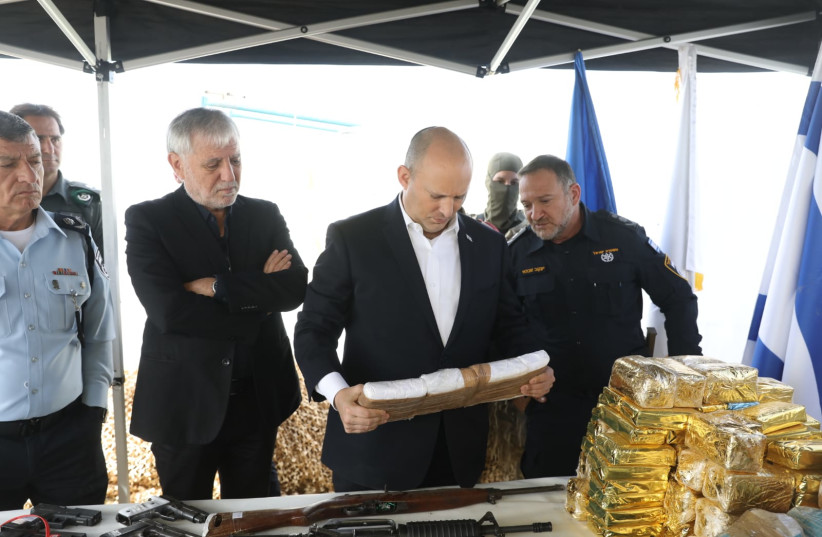Israel is moving from defense to offense in the way it combats crime in the Israeli-Arab sector, Prime Minister Naftali Bennett said on Monday during a tour through the South.
More than 100 Israeli-Arabs have died since the beginning of 2021 in crime-related incidents, in a continuous high wave of crime that has been exacerbated by the pandemic.
“The message to the people of the South is that we are here and will not give up,” he said. “The law of Beersheba and Rahat is like the law of Tel Aviv. We will continue to act until we restore the sense of security to the residents of the South.”
“Civil terrorism is a strategic threat to our existence,” said Beersheba Mayor Ruvik Danilovich, one of the few town leaders with whom Bennett met during his tour. Danilovich said during the meeting that it was time to restore governance immediately, with all its might and without compromise – enforcement, deterrence and punishment – to begin regulating Bedouin settlements and to embark on a socioeconomic plan for the Negev.
“The struggle to restore governance in the South requires a broad mobilization of all government officials,” Regional Council Center chairman and Merhavim Regional Council head Shai Hagag said at the hearing.
“A comprehensive solution must be brought – and it is not enough to increase forces on the ground,” he said. “An inter-ministerial committee should be set up with the directors of the ministries in cooperation with the local authorities, the Public Security Ministry, the Finance Ministry, the Interior Ministry [and the] Justice and Education [ministries], to prepare a national plan to combat crime.”

A REPORT by the Knesset’s Research and Information Center revealed last month that crime rates in the Southern District are the highest in the country.
According to Hagag, such a program requires a lot of resources. He emphasized that it is not enough to increase police and enforcement forces. The inter-ministerial committee would work on legislation, toughen punishment, increase financial enforcement, back up the police and, of course, work on education in all localities.
“This government seems to understand... the need to deal with crime,” Ramat Hanegev Regional Council head Eran Doron said at the meeting. “I hope that the state budget will indeed strengthen police forces and their operation, but it is not enough. There is a need to strengthen Jewish settlement, to address education for employment and economic development. The test will be in how this is realized and performs over time.”
Prior to the report, some 58,224 investigation files were opened in 2020 in the Southern District alone, 21% of all cases opened by the Israel Police this year. The district leads in the number of criminal arrests, with 10,111 – constituting 22% of the year’s total.
“We believe in joint regional work, which will lead to growth and prosperity for the entire region without religious, race or border differences between the settlements,” Bnei Shimon Council head Nir Zamir said.
“At the same time, we all feel in recent times that there has been an increase in cases of violence and crime in the council and in the entire Negev region. Criminal and extremist forces must not harm the delicate fabric of life we have built here over decades. We will not give it a hand and we will fight it together.”
Dimona Mayor Benny Bitton, referring to the meeting of the South’s authority heads on Army Radio’s “Noon Journal” program, said: “We do not have time for plans; we want results. It is not possible to continue like this ‘in the backyard.’ We did not get many answers. The police told me that they have no police force and that they do not have the ability to function. Give us more standards.
“We are tired of all the promises,” he said. “It did not start in this government but what is happening now is crossing all the redlines. I told the public security minister that he is detached from his office and from what is happening. We need resources and budgets.”
